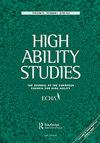Psychological constructions of learning potential and a systemic approach to the development of excellence
IF 1.8
4区 教育学
Q2 EDUCATION, SPECIAL
引用次数: 12
Abstract
ABSTRACT In this article, we introduce a systemic framework for the development of learning potential to professional excellence inspired by the Actiotope model of giftedness. First, we critically reflect on three theoretical approaches representing different psychological constructions of learning potential. We label these approaches theories of giftedness, theories of practice, and theories of motivation. We explore contradictory ways in which these theories construct key factors that determine the successful development of human potential. Based on this comparison, we discuss the limitations of these theories stemming from their philosophical, methodological, and ideological backgrounds, including disproportionate emphasis on selected developmental factors, implicit one-way causality, and the dominant role of an individual over social influences. We further argue that the contradictory conclusions of these approaches may be reconciled within a systemic framework that acknowledges the reciprocal interactions between the key developmental factors proposed by these approaches, including learning outcomes, achievement motivation, practice and the social environment (including developmental resources and demands). We apply our systemic model in the context of the development of academic careers, in which we document the importance of the proposed components and how their interactions result in the processes of “cumulative advantage”, as well as the context-dependency of the model.学习潜能的心理建构与卓越发展的系统方法
摘要:在这篇文章中,我们介绍了一个系统的框架,以发展学习潜力的专业卓越,其灵感来自天赋的Actiotope模型。首先,我们批判性地反思了代表不同学习潜力心理结构的三种理论方法。我们将这些方法称为天赋理论、实践理论和动机理论。我们探索了这些理论构建决定人类潜力成功发展的关键因素的矛盾方式。基于这种比较,我们讨论了这些理论的局限性,这些局限性源于它们的哲学、方法论和意识形态背景,包括过度强调选定的发展因素、隐含的单向因果关系以及个人对社会影响的主导作用。我们进一步认为,这些方法的矛盾结论可以在一个系统框架内得到调和,该框架承认这些方法提出的关键发展因素之间的相互作用,包括学习成果、成就动机、实践和社会环境(包括发展资源和需求)。我们将我们的系统模型应用于学术生涯发展的背景中,在该模型中,我们记录了拟议组成部分的重要性,以及它们的相互作用如何导致“累积优势”的过程,以及模型的背景依赖性。
本文章由计算机程序翻译,如有差异,请以英文原文为准。
求助全文
约1分钟内获得全文
求助全文
来源期刊

High Ability Studies
Multiple-
CiteScore
4.80
自引率
11.10%
发文量
7
期刊介绍:
High Ability Studies provides a forum for scholars in a variety of disciplines associated with the development of human abilities to their highest level. It is a medium for the promotion of high ability, whether through the communication of scientific research, theory, or the exchange of practical experience and ideas. The contents of this journal are unique in reflecting concerns and recent developments in this area from childhood and across the whole life span in a variety of contexts. Far from being restricted to the traditional focus on high-level cognitive development, it also presents investigations into all other areas of human endeavour, including sport, technology, the arts, business, management and social relations.
 求助内容:
求助内容: 应助结果提醒方式:
应助结果提醒方式:


